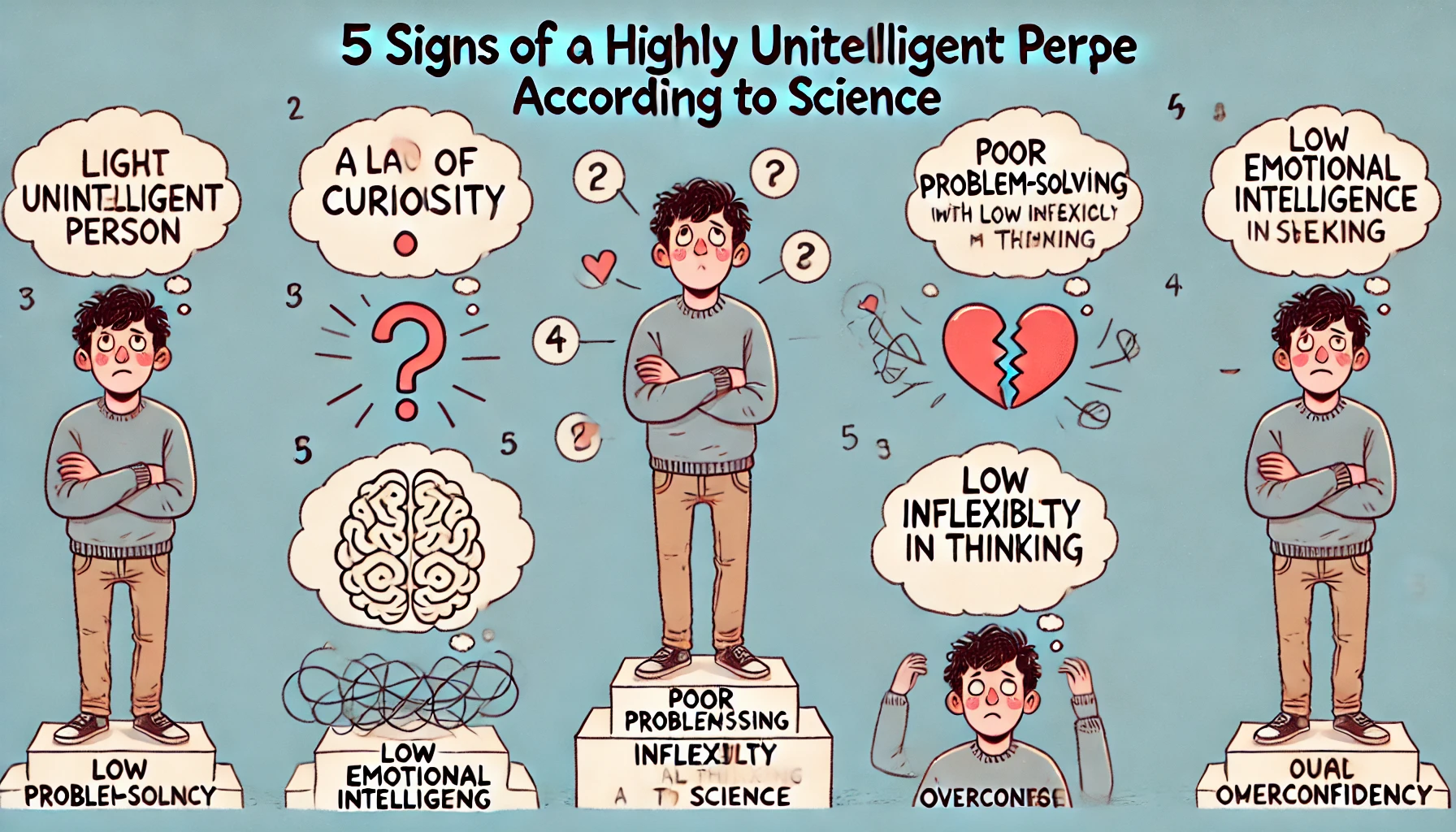5 Signs of a Highly Unintelligent Person According to American Science
Intelligence is a complex and multifaceted trait that encompasses various cognitive, emotional, and social abilities. Understanding the characteristics of lower intelligence can provide valuable insights into human behavior and cognitive functioning. According to American scientific research, here are five signs that might indicate a highly unintelligent person:
1. Lack of Curiosity and Interest in Learning
Curiosity is a critical component of intellectual growth and cognitive development. A lack of curiosity can indicate a limited desire to acquire new knowledge or engage in scholarly activities. news..
- Scientific Insight: Research from the American Psychological Association suggests that curiosity is linked to higher cognitive abilities and better problem-solving skills. Individuals who lack curiosity are less likely to engage in exploratory behavior and intellectual pursuits, leading to lower overall cognitive development.
2. Poor Problem-Solving Skills
The ability to solve problems efficiently is a hallmark of intelligence. Individuals who struggle with problem-solving may exhibit lower cognitive skills and difficulty in handling complex situations.
- Scientific Insight: A study published in the journal Intelligence found that effective problem-solving skills are closely associated with higher intelligence. Those who consistently struggle with problem-solving tasks tend to score lower on measures of cognitive ability.
3. Low Emotional Intelligence
Emotional intelligence (EI) refers to the ability to understand, manage, and express emotions effectively. Low EI can manifest as difficulty in recognizing and regulating one’s own emotions, as well as understanding and empathizing with others.
- Scientific Insight: According to research from the Journal of Personality and Social Psychology, individuals with low emotional intelligence often have poorer social interactions and higher levels of interpersonal conflict. This can be indicative of lower overall intelligence, as EI is a crucial component of effective communication and relationship management.
4. Inflexibility in Thinking
Cognitive flexibility—the ability to adapt one’s thinking and behavior in response to changing circumstances—is essential for intelligent functioning. Inflexibility in thinking can signal a rigid mindset and an inability to adapt to new information or situations.
- Scientific Insight: Studies in cognitive psychology have shown that cognitive flexibility is linked to higher intelligence and better adaptive problem-solving. Individuals who exhibit inflexible thinking are often less able to cope with new or unexpected challenges, reflecting lower cognitive functioning.

5 Signs of a Highly Unintelligent Person According to American Science
5. Overconfidence and the Dunning-Kruger Effect
Overestimating one’s abilities, especially in areas where one is incompetent, is known as the Dunning-Kruger effect. This lack of self-awareness and overconfidence can be a sign of lower intelligence.
- Scientific Insight: Research by psychologists David Dunning and Justin Kruger at Cornell University demonstrated that individuals with lower cognitive abilities are more likely to overestimate their competence. This overconfidence can hinder learning and improvement, as individuals fail to recognize their deficiencies and seek necessary growth opportunities.
Understanding the signs of lower intelligence can help identify areas for personal development and educational intervention. Traits such as a lack of curiosity, poor problem-solving skills, low emotional intelligence, inflexibility in thinking, and overconfidence in one’s abilities can all be indicators of lower cognitive functioning. Recognizing these signs can promote better self-awareness and encourage efforts to improve intellectual and emotional capabilities.
References
- Kashdan, T. B., & Steger, M. F. (2007). Curiosity and pathways to well-being and meaning in life: Traits, states, and everyday behaviors. Journal of Personality and Social Psychology, 93(5), 924-937.
- Sternberg, R. J. (2004). Successful intelligence as a basis for entrepreneurship. Journal of Business Venturing, 19(2), 189-201.
- Mayer, J. D., & Salovey, P. (1997). What is emotional intelligence?. Emotional development and emotional intelligence: Educational implications, 3-31.
- Scott, W. A. (1962). Cognitive complexity and cognitive flexibility. Sociometry, 25(4), 405-414.
- Kruger, J., & Dunning, D. (1999). Unskilled and unaware of it: How difficulties in recognizing one’s own incompetence lead to inflated self-assessments. Journal of Personality and Social Psychology, 77(6), 1121-1134.









